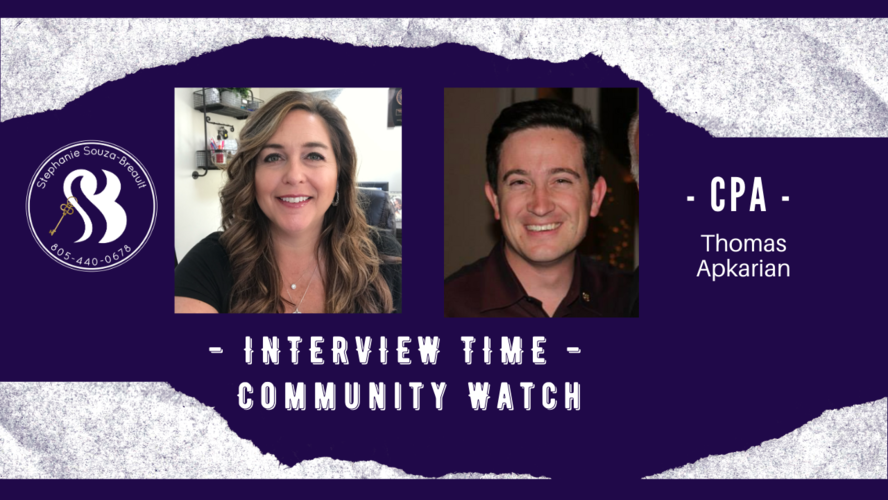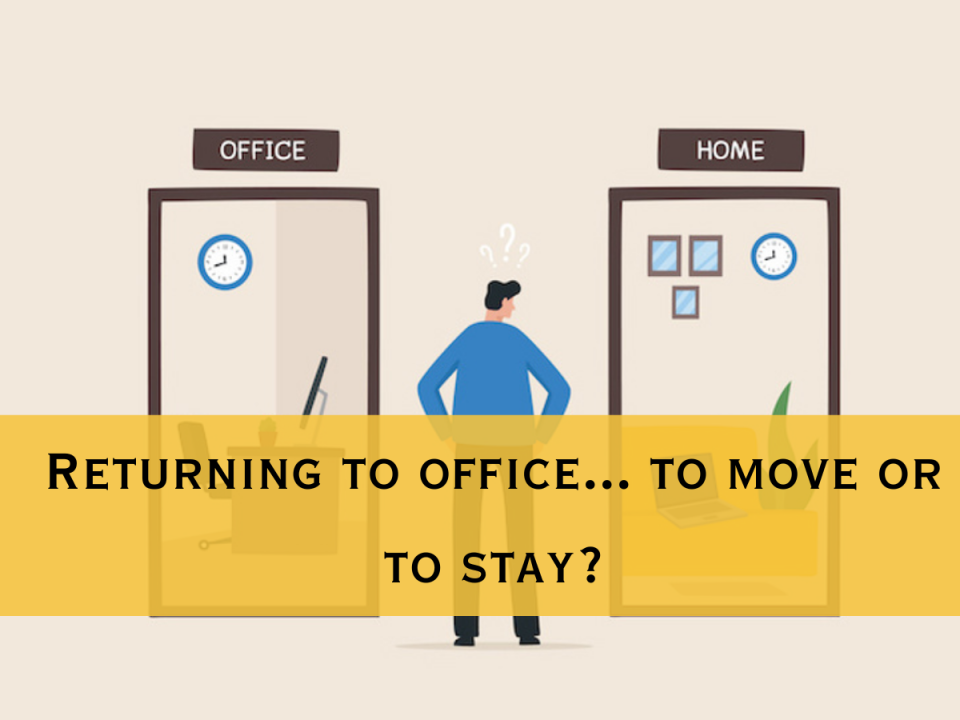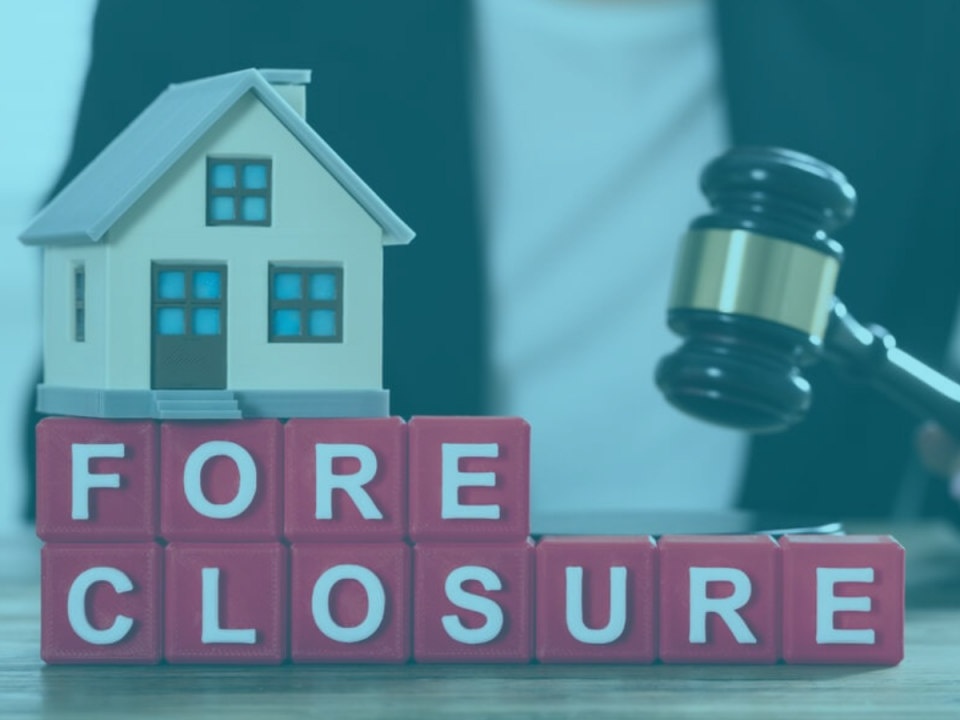Interview with Thomas Apkarian, a Local CPA | Orcutt, CA

Stephanie talks with Thomas Apkarian, who is a local CPA located in the Old Orcutt. Some straight talk to touch on some of the tax changes that are coming with the Covid-19 situation. Asking the questions that lots of people are asking and understanding that more changes will be coming down the pipeline.
Thomas can be reached at McDermott & Apkarian at 805-922-4035 or tvacpa@ma-cpas.net
-Okay, we are here, thank you for joining us. And we are here with Thomas from Apkarian in Old Orcutt. He is a local CPA and he’s here to help us put some thoughts and insights into everything that’s going on, and some questions that everybody might have on the tax forefront. So, Thomas, thank you very much for joining us. And uh-
– Oh, you’re welcome.
– Why don’t you introduce yourself a little bit and tell us a little bit about you and what your specialty is.
– Yes, my name is Tom Apkarian, or Thomas Apkarian, I’m a local CPA in Old Orcutt, right above the old Rooney’s, or Blast 825 now. I’ve been in business with my business partner Pat McDermott, since January of 2010. Just a little bit about our firm is we just brought in a new partner in January of this year, Ben Watson. He’s doing a great job. What a different dynamic than any of us expected with everything going on and tax season, and a new tax law a couple years ago. Kind of our specialty and if you don’t know about me, is we handle a little bit of a wide variety of clients anywhere. We have one that’s around the world, we have several, mainly here on the central coast Stanislaus, Santa Barbara county but we do have a chain of clients that are all over the central coast or up and down the state of California, and what we really prefer is those clients that we can do the planning not just so much a W-2 or a 1098 mortgage interest but whether they have a rental property or they are in the front of, hey we have a small S Corporation and What can we do for them, you know, is it the pension plan? Is it buy the rental property? Buy the investment property? Buy the new car or truck or tractor? There’s just so many cool things that we can do and I’m probably going to put myself out of business for making this comment but really the tax return is the by-product. It’s all the things we can do going into it. So that’s a little bit about myself.
– That’s awesome. I can personally speak because I love working with you and I know several people that work with you as well and you, one of your advantages for the normal people in the world is you break it down to where you can understand. You speak English and you don’t speak “tax code” to people. You know it’s really easy to understand where you’re at and some goals to get you where you want to be. So, myself I’ve experienced working with you professionally and I love it. So thank you for that. I’m sure with everything that’s going on, within the tax season normally and you’re busy anyways, but now that we have all these COVID changes,
– Yeah
– How has this changed the last few weeks? What are you experiencing?
– Well, it’s absolutely crazy. Normally, well I would say normally at this time I would be on vacation because tax season would be over. But, the reality is today is, I’m looking at my computer to see the date, it’s April 24th and honestly you might as well have hit the reset button and it’s now January 24th in the tax world, because I’ve got another, till July 15th to file everything, and where we’re spending more time is you know the small business owner that’s going “How do I pay payroll? How do I pay rent? How do I do everything virtually like we’re doing today? I personally got half my staff working from home. That’s a big change. I’m used to the face-to-face let’s put the tax return in front of both of us and let’s discuss it together and it’s the whole new world and honestly, every morning I get up and spend at a minimum an hour a day, just reading what Congress did the day before or what changes we have and more importantly, the interpretation of it. I mean it’s… It’s new by the day and if it doesn’t change by the hour, it’s unbelievable.
– Yeah . . .a lot day to day or hour by hour
– Yeah
– Experience and interpret everything.
– Yes So, we touched on a little bit of it. So the government programs that are out there, I’m sure you’re getting inundated. You had mentioned to me that you have 50 plus calls a day of people asking on the PPP programs, the EIDL programs. Are you able to help people through that and navigate how to fill out those applications and give them some guidance? How are you handling that?
– Well, that’s a great question. I mean, I am able to help everybody with that. I work with several different lenders here on the central coast as far as the banking. First thing I always do is I tell everybody, you know, contact your local bank, you know, because you want to work with them. A lot of the banks are so backed up, or credit unions are so backed up they can’t take a new customer. I don’t think any of us were ready for this. But I kid you not, if I talk to five different bankers right this second, I’d have five different applications for the same client. So it’s very, very different and what I’d… What I’d love to do is really sit down and say “Okay, get that form from the bank. Let’s fill it out based on their spreadsheet.” It’s probably-I say it’s five different formats, but it’s not that far off. And I’ve done enough of them, or helped the clients say “Go get your 940s, go get your 1099s, go get-” I can guide you to where we need to go. And if we- What I like to do is with my clients that we’re filling these out for is prepare a nice work paper for it and say, “Okay, this is what we included.” And if one of the lenders wants to not include certain things or add something they can see what we did. And it’s been real nice because what I like to do is include everything possibly and let them cross it out, but at the same time, they know where I came up with it. We’re not making numbers up, but we’re finding… We want to maximize these things because all of us small business owners are struggling for this time, so.
– Yeah, I think that you’re able to help people through that because I’ve talked to a lot of people that are just lost in that whole dynamic of who to go to, so, with some guidance from a professional that gives people a little peace of mind of how to fill out the paperwork. Do you see with those programs, the EIDL and the PPP, do you see any tax complications, or ramifications I should say, coming down the pipeline if people choose to use those programs?
– Great question. So, I mean, and again, this changes. It’s not like the tax law that’s been around for the last ten years and oh, they just tweaked two or three things. It’s literally changing- well, our interpretation is changing by the day. But with the PPP plan specifically, if you use the funds in the proper manner- and again, every lender may have a different spin on it- but basically, in a nutshell, if you use your money for your payroll, that’s the main idea, for rent, for utilities, for things- What the design of the plan was to keep your employees employed. Because, like I said, all our businesses are down. I’m sure your sales are down, my collections are down, I mean, across the board. The idea is we want to keep everybody employed. And so, the ramification that I see with this is down the road, if you use it properly, the loan is actually… turns into a grant. Then it’s non-taxable income coming into your returns. So let’s say you get a hundred thousand dollars on this PPP loan, you can have a hundred thousand dollars tax-free, then you have your payroll that you spend, your utilities, and again, you have to follow the criteria, and I don’t want to get into too much specifics because every single person is a little different and their lender might want something a little different, but if you use the specifics it’s forgiven. You don’t pay the tax on the hundred grand. At this particular time our understanding is those hundred thousand dollars worth of expenses is kind of the best of both worlds because you still get to deduct them. Now, will that be clarified a little later and changed a little bit? It might. At this particular time, California has not said that that is tax-free money. So my understanding is, if you get a hundred thousand dollars the federal government’s saying- and use it properly- it’s tax-free on the federal side; the state side you’re gonna end up paying tax on it. So, really going to make tax returns… The 2020 tax returns are going to be a lot of fun to figure out. And again, not a ton of guidance, but we’re- I’m gonna imagine over the next two to three months we’re really going to have this dialed in and know what we can… But my help with the- our local- with our clients, as I help them with that, is, “Here’s how you should use it. We’re going to use it to the best of our ability to follow the program.” And then, “Here’s our understanding and interpretation of the tax code on it currently.” But it probably will change to some level. But by July or August, when we hopefully get to somewhat of a new norm I hope, hopefully we will have some guidance and be able to help you plan for the rest of the year.
– Okay. Good. Good information. So switching gears a little bit, there’s a lot of independent contractors out there, and they pay quarterly taxes.
– Yep.
– What do they do if they’ve been stay-at-home orders, they’re not able to work, their quarterly taxes are coming up? If they can’t pay them, what’s some of your suggestions of how they handle that? What do they do with those?
– Great question. And really again it’s everybody’s a little different on this, so I don’t want to have anybody quote me and say, “Well Tom said you could do it this way.” But if you’re an individual tax return, and normally speaking if you’re a sole proprietor you usually pay estimated tax payments in April, June, September and January. The April and June estimates have all been moved to July. So hopefully by July 15th, our cash flow all improves and we’re in a position where myself and my contractor, we can pay our estimates. And that same thing goes with the normal April 15th deadline. It’s- a lot of clients are calling me and asking “Hey, did you extend my return?” No, I didn’t extend your return. Actually really they just pushed the entire due date. That’s why I made that joke at the beginning that it’s like January 24th in my world except it’s beautiful outside. So, really there’s some delays there and, if you get to July and you go “Geez, I still can’t pay,” you know, because again, I don’t know what the effects on your specific business are, you could extend the tax return til October. I mean at this particular time the normal extension from April to October is not going to be from July to October. And you get yourself a nice 90 days extra to come up with some cash. And what’s nice about that is it stops all the penalties. The IRS will charge you some interest on your money but the reality is it’s all based on prime, and interest rates right now are pretty darn low. So you’re probably are- it’s probably going to be a pretty small interest bill on that. If you get to October and you still can’t pay, we can put you on a payment plan, we can set up- There’s all kinds of options. Hopefully by October you’re in a position that you can pay for your fall previous year’s tax return. And, another thought that just comes up with the conversation is: you know, normally a lot of my clients, we do our estimated tax payments based on 110% of the prior year tax, well… That’s nice when the economy is soaring like 2018 and 2019, but 2020, I’m gonna imagine all of us are gonna have a decrease, so we might really want to look at it and say the IRS gives you the option of, “Hey, if my net income’s cut in half, we can base your estimates based on the current levels.” So, there’s really some cash flow things that we can do to help you out. And, without getting into specifics there’s ways of even deferring some of the estimates. But the reason I don’t want to get into the detail on that, Stephanie, is some of my clients, and our mutual clients, will end up getting this Payroll Protection Plan, and if they use that, they can’t also defer certain things. So it’s really- You need to check with your team, whether you use me or you use one of my business partners or your own CPA, um… check with us. It varies, but for the most part you can absolutely count on, no exceptions all those April 15th payments, you can wait til July, so don’t pay them early.
– Now for those people that are out there that, they might have a bookkeeper, or maybe they do their books themselves but they don’t have a CPA, they’re watching this and they’re really like- you, maybe want to get in contact with you. We all know that you’re busy right now. What’s the best way for new clients that are coming in, that are possibly seeing this, to get in touch with you and get started? Would you rather them email you, go to a website, call? How are you filtering new business and how would you prefer that to come in?
– Great question. You know we do have the email and the phone calls and I’m still in the office at least six days a week right now just filtering all this. And like I said, I’m spending more time researching than actually preparing things right now. But, really, if you call in, we can- we might have to- Normally, I’d love to get you in ASAP, but the reality is, we might have to book you out two or three weeks. Just, if it’s a quick, five minute, “this is what we can do,” just give the office a call or shoot an email. But I- normally my goal is always to respond to everybody within 24 hours. I’ll be honest right now, it’sometimes a week out and it’s not intentional, it’s just the sheer volume
– Yeah,
– is what’s getting in our way a little bit. But know we’re here to help you. Usually the telephone for me is the best way and then if I can’t get back to you I’ll get somebody that will and get you on the calendar.
– Okay, awesome. Well, we appreciate all this great information. I do have one question for you, is: If you had to give a message of hope to the community right now, what would you like to leave it with?
– Ah, that’s a great question. Wow. That- You put me on the spot here, Stephanie, but, you know, the message of hope that I have is I really think when this is all done, when the flip side- and who knows when, I mean, I-of course, I hope it’s yesterday- but, I think there’s gonna be a lot of good. I think there’s been a nice- I think we’ve all slammed on the breaks a little bit and realized that we can be a little bit more patient. We don’t have to be so instantaneous as the world has been the last ten years. Maybe slow down a little bit and really be here for one another and really put your good teams together and time for us probably to look at reality and make sure we’re supporting our local restaurants or local take-outs or… When we get back to normal, let’s make sure we use our local folks and I- like I said, the community as a whole, we’re- my business in particular, we’re very involved with several nonprofits. And we’re all still gonna be here together. And it might but a slow ramp up but we’re gonna- I think this community especially as Stanislaus or Santa Barbara County, we’re great that way. And I think this is gonna get us back that way even more so. So I’m- I don’t want to call this the new normal. I hope we get- I don’t think we’ll be back to the old way for quite some time, but hopefully something in between. And, like Stephanie, when you and I first got on this call, jeez, we’re learning, hey we can do this over the phone; we don’t have to be in person all the time. I mean, I think this kind of reiterates you don’t have to live in Orcutt or Santa Maria to be my client. You could be in Salinas and we can jump on the phone like this, or San Francisco, so I think there’s gonna be a lot of good that comes out and I’m personally kind of excited to see maybe some of the technology that comes out with maybe cleanliness, maybe a card reader or you know, something that just… um, helps the… Like I said, lot of- push the reset button and I think we’re gonna have some positive.
– Yep, I totally agree. I totally agree. Well, thank you for your time. Thank you for answering all those questions we have, and I appreciate it. I love your message of hope to the community and, as always, thanks Thomas. I appreciate it.
– Oh, absolutely and stay healthy.
– All right, you too.
– Okay, thank you.
– Thanks.



